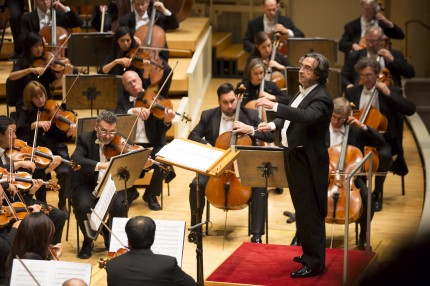Muti, CSO pop the seasonal cork with fizzing exuberance and weighty drama

Riccardo Muti officially began his fourth season as Chicago Symphony Orchestra music director with a concert Wednesday at Morton East High School in Cicero, part of the Italian conductor’s attempt to bring great music to audiences that rarely get a chance to experience it.
Muti and the CSO were back on home turf Thursday, performing their first Symphony Center program of the season.
Brahms’ Symphony No. 2, also on the menu in Cicero, was the main event of the downtown program. Yet worthy as that performance was, in many ways it was the three shorter works on the first half that showed the partnership of Muti and the CSO at its most winning and individual.
The evening began with the Overture to Indigo and the Forty Thieves. This curtain raiser to Johann Strauss Jr.’s obscure first operetta—a work somewhat more familiar in its revised form as One Thousand and One Nights—was given the full-tilt Muti treatment. With a lyrical warmth, buoyancy and hairpin dynamic wit, Muti and colleagues elevated this effervescent bonbon–almost–to the level of high art. Few batonsmiths can bring out the quirky humor of such light music as well as the CSO’s music director and the fizzing, exuberant playing by the orchestra made this curio a surprisingly effective leadoff to the season.
The program next segued into the dark side with the Ballet Music from Verdi’s Macbeth. Muti has said that he believes this eleven minutes of music, written for the revised version of the opera, to be among Verdi’s greatest achievements in purely symphonic writing.
That’s quite possible, largely because there is, in fact, very little non-vocal orchestral music from Verdi. The ballet score served as a compelling appetizer of sorts for the full Macbeth opera, which we will get from Muti and company next week. Under his concentrated direction, the CSO delivered the taut drama, with notably stentorian brass attacks, and warmly yielding strings (John Sharp contributed a beautifully burnished cello solo). This imposing, powerful music does almost feel like a torso from an uncompleted larger work and makes one wonder what a Verdi symphony might have sounded like.
Nothing unfamiliar about the overture to La forza del destino. Here too, Muti drew a reading that managed to seamlessly blend explosive tuttis and a jabbing edge to the insistent main theme with light graceful string articulation.
Muti and the CSO musicians performed Brahms’ Symphony No. 2 as recently as spring of last year. Thursday’s performance was again superbly played, although it felt more Germanic, with stately tempos that didn’t quite equal the freshness and excitement of last year’s performances.
The first movement recalled CSO Brahms in the Giulini mode—taut yet flowing with weighty textures. Still, for all the fluency and polish of the playing, at times the performance felt too controlled and, in this most pastoral of Brahms symphonies, the music needed to relax just a bit more. So too in the finale—Brahms’ most viscerally thrilling inspiration—at a steady tempo the music felt like it was being held on too tight a leash and one wanted the orchestra to cut loose with more unbridled fervor in the exultant coda.
In many ways, the middle movements proved most successful Thursday. The dark introspection of the Adagio was explored with a lean, unsentimental expression, all the more sffecting for its understatement. And the Allegretto was delightful, the woodwind principals floating the music with a light touch and bucolic charm.
Riccardo Muti will lead soprano Barbara Frittoli, bass Luca Dall’Amico, the CSO and CSO Chorus in the Gala Ball concert 7 p.m. Saturday at Symphony Center. The all-Verdi program will include the Overture and chorus “Va, pensiero” from Nabucco; the Ballet Music and aria “Patria oppressa!” from Macbeth; the aria “Si ridesti il Leon di Castiglia” from Ernani; the Act 2 finale from La forza del destino; and the Overture to I vespri siciliani. cso.org; 312-294-3000.
Posted in Performances





Posted Sep 27, 2013 at 1:45 am by Paul, Chicago
Muti gave it his all in the first half and he appeared tired and drained when he took the podium for the Brahms. The Brahms featured predictably expert playing but lacked the focus, drama and excitement of the two Verdi selections and the effervescent Strauss.